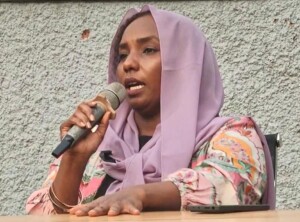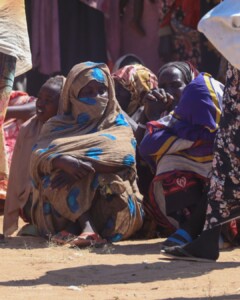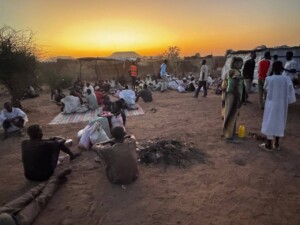Sudanese doctors in UK urge Khartoum to declare cholera, take action themselves
The UK-Ireland section of the Sudanese Doctors’ Union has called on Khartoum to officially declare the outbreak of cholera and activate the disaster protocols. The Union itself is taking actions to help contain the rapid spread of the epidemic.
The UK-Ireland section of the Sudanese Doctors’ Union has called on Khartoum to officially declare the outbreak of cholera and activate the disaster protocols. The Union itself is taking actions to help contain the rapid spread of the epidemic.
In an interview with Radio Dabanga broadcast today, Sarah Abdeljaleel, Media Secretary of the Sudanese Doctors' Union in the United Kingdom and Ireland, said that “Urgent intervention is needed to stop the growing number of cholera deaths and infections among the people in Sudan.
“The Sudanese Health Ministry must officially acknowledge the large cholera outbreak as soon as possible. It would be the first serious step towards eradicating the epidemic that is now spreading to so many areas.
“The collapse of the health services in the country requires intervention by international organisations to help eradicating the epidemic, and that can only be done if the government officially declares the cholera outbreak,” the doctor said.
“The emergence of cholera and the collapse of environmental health in rather stable urban areas that are not afflicted by disasters or conflict confirms the failure of the state,” she added.
The National Epidemiological Corporation criticised the Sudanese government last week for neglecting environmental sanitation in the country. The accumulation of waste and dirt is a major contributor to the outbreak of the cholera epidemic, a member of the Corporation said.
‘Watery diarrhoea’
Between August 2016 and May 2017, 14,659 people were infected with watery diarrhoea. 292 patients died, according to the Sudanese Minister of Health.
In the past months, many Sudanese medics have criticised the refusal of the authorities to call the disease by its real name and instead continue to refer to it as “watery diarrhoea”.
The National Intelligence and Security Service (NISS) has repeatedly warned the press in the country not to cross this “red line”. In April, an eastern Sudanese journalist was detained for reporting about cholera. Earlier this month, the Ministry of Health dismissed the director of the Omdurman Emergency Hospital because he mentioned the forbidden word.
Cholera “seems to be a stigma for the government,” a Sudanese specialist told Radio Dabanga in January. “Yet raising the awareness among communities about preventing cholera is crucial to containing a cholera outbreak.”
The actions of volunteer groups in various places in the country, by cleaning residential areas and giving information about how to prevent contracting the disease may help to a certain extent. “Yet, the Sudanese citizen has the right to know that the watery diarrhoea is cholera and to receive the right treatment,” Abdeljaleel said.
Actions
She reported that the Sudanese Doctors’ Union-UK-Ireland has initiated the establishment of the National Corporation for Disaster Prevention in May 2017, by 20 bodies from Sudanese health and medical sectors in Sudan and abroad, including the Sudanese Doctors Association in Saudi Arabia, and voluntary groups such as the Emergency Street Initiative, the Association of Graduates, and the No to Women Oppression group.
The UK-Ireland section of the Sudanese Doctors’ Union, in cooperation with Sudan’s National Epidemiological Corporation, is collecting financial support from inside and outside the country, as well as in-kind support such as clean water, antibiotics, and gloves for the medics and volunteers working with cholera patients.
“We are also planning awareness raising campaigns in the various dialects of the country. We will use drawings to inform the illiterate Sudanese,” Abdeljaleel explained.
“We have asked the imams of the mosques in the country to give information about the disease in their Friday sermons, and medical staff of hospitals, clinics, and health centres to treat the infected people with care so that they themselves will not spread the infection.
“The initiative is providing support to anybody working in the fight against cholera without discrimination,” she said, calling on “all other other professional sectors to work together to contribute to the eradication of cholera, as the disaster is far greater than one initiative can cover – which is the responsibility of the government in the first place.”
New cases
In El Salam locality in White Nile state, south of Khartoum, more than 100 new cholera cases were reported on Thursday.
A medical source told Radio Dabanga that the rate of new infections in the main towns of the state, Rabak, El Duweim, and Kosti ranges between five and ten cases a day. He said that the spread in El Maraabi and Wad El Lebeih seems to slow down.
He said that no new cholera cases were recorded in the eight South Sudanese refugee camps in the state.
In South Kordofan, about 100 people have been infected with cholera in the El Wakara administrative unit in El Tadamon locality last week. On Friday, the director of the El Wakara Health Centre told Radio Dabanga that the centre receives 20 to 30 cases a day.
He expressed concern about the spread of the disease because of “the huge shortage of medicines and health professionals”. He called on the authorities to provide intravenous solutions as soon as possible.
El Fadil Mohamed, member of the Popular Committees of Umelkheirat village in El Wakara which has witnessed the highest rate of the disease in the area described the situation as embarrassing, and called on the authorities to intervene to contain the disease.
At the hospital of Delling, one cholera patient died and another was admitted on Thursday and Friday. A medic reported that the hospital daily receives two to three cholera cases.
Schools closed
The Minister of Health in eastern Sudan’s El Gedaref closed all basic, secondary, and Koran schools in the state for two weeks as of Sunday, “as a precautionary measure to combat the epidemic”.
He appealed to the people in the state to follow the Health Ministry’s guidelines for the prevention of watery diarrhoea.
The locality of El Faw recorded 20 new cases, in addition to the 45 cases reported at the Umgargura refugee camp on Wednesday and Thursday. At Umgargura village near the camp, seven new cases were reported.
In Kassala state, the National Epidemiology Corporation reported four new cholera patients in Wad Sharifi, and four new cases in El Shajarab refugee camp.
Khartoum, El Obeid
A report issued by the Sudanese Epidemiology Corporation revealed 65 new cholera patients at Albanjadeed, Bashayer, and Omdurman hospitals on Thursday.
The El Obeid Hospital in North Kordofan received one new case last week. 33 patients are currently being treated in isolation centres in the state capital.
Dr Amer Adam, a specialist at the El Obeid Hospital warned for more infections because of to the spread of huge swarms of flies in the city's residential districts.











 and then
and then